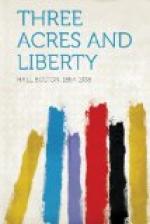“And now the sun is going to rise. We have started a revolution that will not end until the breath of the earth has come back to the soul of the people. The tyranny of the machine is going to be broken. The tyranny of the land monopoly is going to be lifted. Yes, you say, but these people that I see working on the allotments are not the people from the courts and the slums; but professional men, the superior artisan, and so on. That is true. But the movement must get hold of the intelligenzia first. The important thing is that the breach in the prison is made; the fresh air is filtering in; the idea is born—not still-born, mind you, but born a living thing. It is a way of salvation that will not be lost, and that all will travel.
“We have found the land, and we are going back to possess it. Take a man out of the street and put him in a garden, and you have made a new creature of him. I have seen the miracle again and again. I know a bus conductor, for example, outwardly the most ordinary of his kind. But one night I mentioned allotments, touched the key of his soul, and discovered that this man was going about his daily work irradiated by the thought of his garden triumphs. He had got a new purpose in life. He had got the spirit of the earth in his bones. It is not only the humanizing influence of the garden, it is its democratizing influence too.
“When Adam delved and Eve span
Where was then the gentleman?’
You can get on terms with the lowliest if you will
discuss gardens.”
CHAPTER XXVIII
SUMMER COLONIES FOR CITY PEOPLE
(Condensed from the Annual Report of the U. S. Department of the Interior of the Commissioner of Education. Vol. 2, now out of print.)
BERLIN has not been boastful of a new sociological feature which it has developed within the last fifteen years, a feature so revolutionary in its bearing upon education and upon the general health of future generations, that it should be made known to the world. As yet little has been said about this new agency. It may be because it is not a governmental institution, but the result of self-help and of the recognition of a plain necessity. It may be assumed that if the summer colonies had been instituted by the government for the great majority who are poor it would not have succeeded so well as it has.
The teachers, seeing that the horizon of their pupils was limited by brick and mortar (for open park spaces are rare in Berlin), came to the conclusion that only by giving their pupils opportunity to live in the open air could they lay a sound foundation of knowledge of natural objects and processes as a basis for school studies. The teachers of themselves, however, could apply only palliative remedies, such as having sent to them, from the botanical gardens, thousands of specimens of plants, twigs, flowers, fruit, etc., for nature study in the schoolroom; planting flower beds around the schoolhouses; also, brief excursions into parks, and hanging up before the class colored pictures of landscapes and rural scenery.




